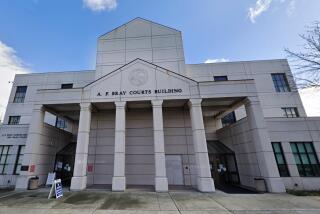Lawyer says NYC jail guard being made a scapegoat for death of inmate
The lawyer representing a New York City jail guard, charged in connection with the death of a homeless ex-Marine in a 101-degree cell, defended his client, arguing that she is being made a scapegoat for the system’s dysfunction.
In a statement emailed to reporters, attorney Damond J. Carter said his client Carol Lackner would be exonerated. Lackner, who was arraigned and released on her own recognizance on Monday, faces as long as four years in prison if convicted of the 26 counts relating to the death of Jerome Murdough in February.
Murdough died from hyperthermia due to exposure to extreme heat, according the New York medical examiner’s office.
“We have absolutely no doubt that Officer Lackner will be exonerated of the largely duplicative indictment,” Carter said in a statement sent late Monday to reporters. “It is true that the New York City Department of Correction must be reformed and that Mr. Murdough’s death was avoidable. Nonetheless, that does not translate into Officer Lackner’s guilt, at the hands of a municipality seeking a scapegoat for its Correctional Institution’s long and storied dysfunctionality.”
Lackner, 35, faces multiple counts of falsifying business records and official misconduct for writing in a logbook that she toured the special unit every 30 minutes. Video from the jail did not show any such visits, prosecutors allege.
Lackner was suspended for 30 days after Murdough’s death.
According to Bronx Dist. Atty. Robert Johnson’s office, Lackner, a jail guard for more than eight years, was scheduled to work during the late-evening and overnight hours at the Anna M. Kross Center’s mental observation unit on Feb. 14.
Prosecutors say that Lackner was required to regularly tour the unit during her shift. “She made logbook entries claiming she did those tours and the rest of her job during the three hours she was there, despite not performing work,” according to the charges.
Murdough’s body was found shortly after Lackner had left for the night on Feb. 15. It was unclear exactly when he died.
But defense attorney Carter stated that he questioned whether Murdough should have been in such a cell in the first place.
“Although the New York City Department of Correction’s rules, regulations and directives required that Mr. Murdough not be placed in a mental observation housing area lacking air-conditioning, he was nonetheless placed in such a mental observation housing area,” according to Carter. “That placement was pursuant to the conscious decisions of high ranking New York City Department of Correction officials who were well aware of both such rules, regulations and directives, and Mr. Murdough’s physical condition. Nonetheless, those revelations do not give rise to Officer Lackner being criminally liable.
The Associated Press first reported Murdough’s death, after a city official, speaking on condition of anonymity, said the former Marine “basically baked to death” when he was left unchecked for at least four hours as malfunctioning equipment caused his cell to overheat.
Murdough’s death -- along with the death of another mentally ill inmate in a similar mental observation unit five months earlier -- prompted Mayor Bill de Blasio to create a task force to study how the mentally ill are treated in jail.
Last week, De Blasio announced that task force’s finding, saying he’ll spend $130 million over the next four years to improve how the mentally ill interact with the justice system.
Murdough’s mother, Alma Murdough, had announced that she intended to sue, but city officials agreed to a $2.25-million settlement before any lawsuit was filed.
Follow @latimesmuskal for national news
More to Read
Start your day right
Sign up for Essential California for news, features and recommendations from the L.A. Times and beyond in your inbox six days a week.
You may occasionally receive promotional content from the Los Angeles Times.







